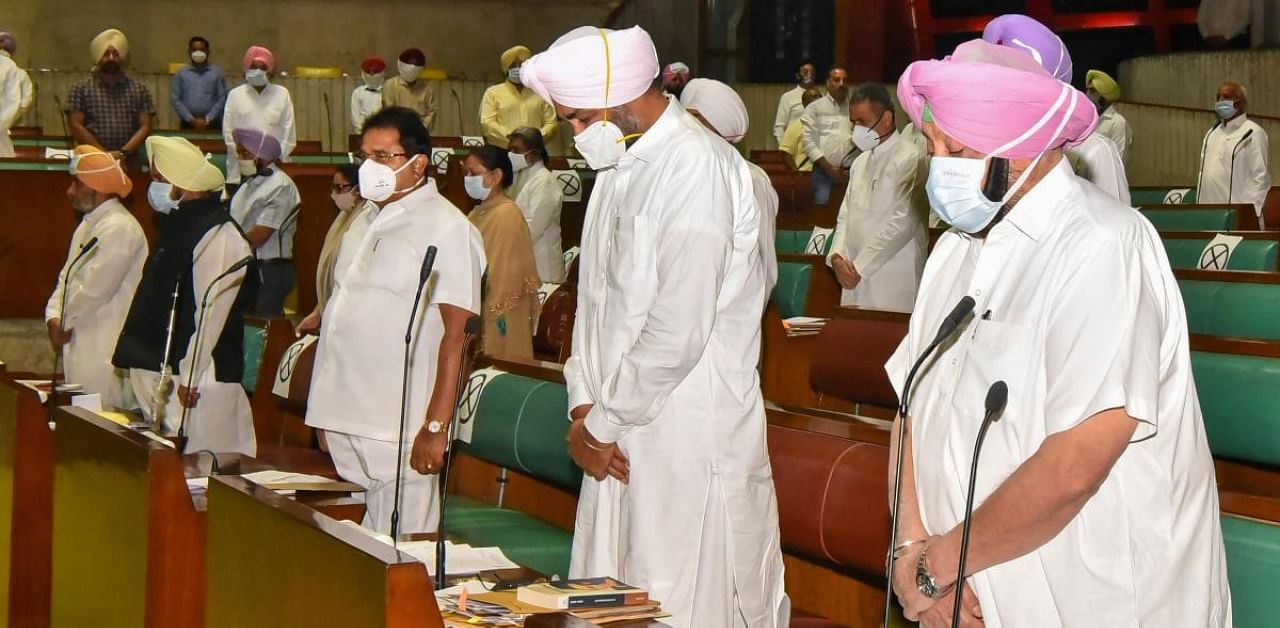
Congress-led Punjab on Tuesday became the first state in the country to pass Bills and a resolution to counter the contentious farm laws enacted by the Centre with the support of state Opposition parties Akali Dal, AAP and Insaaf Party.
The two BJP MLAs did not take part in the five-hour debate on the four Bills, which were unanimously passed by the Punjab Assembly, on the second day of a special Assembly session.
The Punjab Assembly's action came against the backdrop of continuing protests in Punjab and Haryana against the The Farmer's Produce Trade and Commerce (Promotion and Facilitation) Bill, 2020, the Farmers (Empowerment and Protection) Agreement of Price Assurance and Farm Services Bill, 2020 and the Essential Commodities (Amendment) Bill, 2020 passed by Parliament last month.
Congress has upped the ante against the "anti-farmer black laws" and had asked the state governments led by the party to pass Bills to negate the provisions of the central laws, which it said goes against the interests of the farm sector.
The passing of the Bills is likely to create further friction with the Centre as it would need the assent of the President. While agriculture comes under State List, the Centre has enacted the controversial laws contending that it dealt with “trade and commerce in and the production, supply and distribution of food stuff” and falls under Concurrent List.
According to Article 254 (2) of the Constitution that deals with legislations related to subjects that fall under Concurrent List, a law passed by the state, which is in variance with an existing law passed by Parliament, would need the assent of the President to be in force.
Soon after the passage of the Bills and resolution, Chief Minister Amarinder Singh accompanied by state Congress president Sunil Jakhar, Leader of Opposition and AAP leader Harpal Singh Cheema, SAD’s Sharanjit Singh Dhillon and other MLAs met Governor V P Singh Badnore seeking his assent.
Singh said the Punjab government would take legal recourse if the Bills do not get assent. He has also sought appointment with President Ram Nath Kovind in the first week of November.
“I have made clear that the bills will go to the Governor, who may or may not approve them. Similarly, if the bills go to the President, he may or may not approve too. But we have our legal experts to take it forward in courts,” he said.
While the central laws seek to deregulate the sale of crops and open up new markets for farmers, its critics, including farmers' unions, alleged that it would lead to the dismantling of the Minimum Support Price (MSP) regime.
It has also asked its supporters to observe October 31 -- birth anniversary of Sardar Vallabhai Patel and death anniversary of Indira Gandhi -- as 'Kisan Adhikar Divas' (Farmers' Rights Day).
The counter bills in the Punjab Assembly provide for imprisonment of not less than three years for the sale or purchase of wheat or paddy below the minimum support price (MSP), exemption of farmers from attachment of land up to 2.5 acres and prevention of hoarding and black-marketing of agricultural produce.
The Chief Minister said in the Assembly as he moved the resolution and three of the four Bills, that if the central laws are not repealed, it would lead to anger among the youth. “I am not afraid of resigning. I am not afraid of my government being dismissed. But I will not let farmers suffer or be ruined,” he said.
Punjab Finance Minister Manpreet Badal moved the fourth Bill -- the Code of Civil Procedure (Punjab Amendment) Bill, 2020 -- aimed at protecting farmers from attachment of land, as a consequence of an agreement or otherwise.
"These three legislations along with the proposed Electricity (Amendment) Bill, 2020 are clearly against the interests of farmers and landless workers, and the time-tested agriculture marketing system established not only in Punjab but also in the original green revolution areas of Punjab, Haryana, and western UP," the resolution said.
"These legislations are a direct attack, and use of subterfuge to encroach upon the functions and the powers of the states, as enshrined in the country's Constitution," it said.
